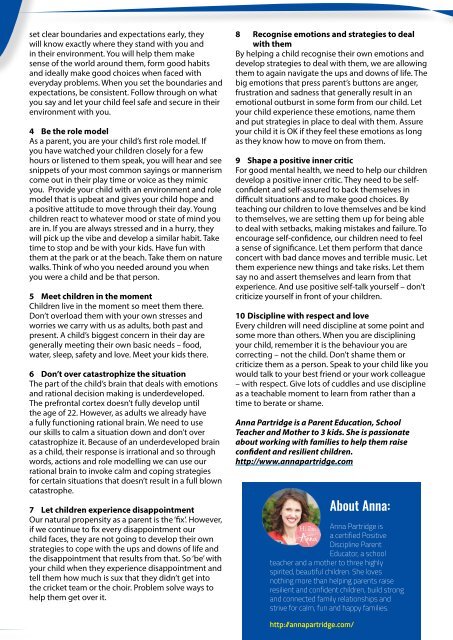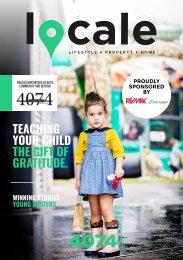Locale Hub 4074 - Issue 2
Locale 4074 Magazine - Jindalee, Middle Park, Mt Ommaney, Sinnamon Park, Westlake, Jamboree Heights
Locale 4074 Magazine - Jindalee, Middle Park, Mt Ommaney, Sinnamon Park, Westlake, Jamboree Heights
Create successful ePaper yourself
Turn your PDF publications into a flip-book with our unique Google optimized e-Paper software.
set clear boundaries and expectations early, they<br />
will know exactly where they stand with you and<br />
in their environment. You will help them make<br />
sense of the world around them, form good habits<br />
and ideally make good choices when faced with<br />
everyday problems. When you set the boundaries and<br />
expectations, be consistent. Follow through on what<br />
you say and let your child feel safe and secure in their<br />
environment with you.<br />
4 Be the role model<br />
As a parent, you are your child’s first role model. If<br />
you have watched your children closely for a few<br />
hours or listened to them speak, you will hear and see<br />
snippets of your most common sayings or mannerism<br />
come out in their play time or voice as they mimic<br />
you. Provide your child with an environment and role<br />
model that is upbeat and gives your child hope and<br />
a positive attitude to move through their day. Young<br />
children react to whatever mood or state of mind you<br />
are in. If you are always stressed and in a hurry, they<br />
will pick up the vibe and develop a similar habit. Take<br />
time to stop and be with your kids. Have fun with<br />
them at the park or at the beach. Take them on nature<br />
walks. Think of who you needed around you when<br />
you were a child and be that person.<br />
5 Meet children in the moment<br />
Children live in the moment so meet them there.<br />
Don’t overload them with your own stresses and<br />
worries we carry with us as adults, both past and<br />
present. A child’s biggest concern in their day are<br />
generally meeting their own basic needs – food,<br />
water, sleep, safety and love. Meet your kids there.<br />
6 Don’t over catastrophize the situation<br />
The part of the child’s brain that deals with emotions<br />
and rational decision making is underdeveloped.<br />
The prefrontal cortex doesn’t fully develop until<br />
the age of 22. However, as adults we already have<br />
a fully functioning rational brain. We need to use<br />
our skills to calm a situation down and don’t over<br />
catastrophize it. Because of an underdeveloped brain<br />
as a child, their response is irrational and so through<br />
words, actions and role modelling we can use our<br />
rational brain to invoke calm and coping strategies<br />
for certain situations that doesn’t result in a full blown<br />
catastrophe.<br />
7 Let children experience disappointment<br />
Our natural propensity as a parent is the ‘fix’. However,<br />
if we continue to fix every disappointment our<br />
child faces, they are not going to develop their own<br />
strategies to cope with the ups and downs of life and<br />
the disappointment that results from that. So ‘be’ with<br />
your child when they experience disappointment and<br />
tell them how much is sux that they didn’t get into<br />
the cricket team or the choir. Problem solve ways to<br />
help them get over it.<br />
8 Recognise emotions and strategies to deal<br />
with them<br />
By helping a child recognise their own emotions and<br />
develop strategies to deal with them, we are allowing<br />
them to again navigate the ups and downs of life. The<br />
big emotions that press parent’s buttons are anger,<br />
frustration and sadness that generally result in an<br />
emotional outburst in some form from our child. Let<br />
your child experience these emotions, name them<br />
and put strategies in place to deal with them. Assure<br />
your child it is OK if they feel these emotions as long<br />
as they know how to move on from them.<br />
9 Shape a positive inner critic<br />
For good mental health, we need to help our children<br />
develop a positive inner critic. They need to be selfconfident<br />
and self-assured to back themselves in<br />
difficult situations and to make good choices. By<br />
teaching our children to love themselves and be kind<br />
to themselves, we are setting them up for being able<br />
to deal with setbacks, making mistakes and failure. To<br />
encourage self-confidence, our children need to feel<br />
a sense of significance. Let them perform that dance<br />
concert with bad dance moves and terrible music. Let<br />
them experience new things and take risks. Let them<br />
say no and assert themselves and learn from that<br />
experience. And use positive self-talk yourself – don’t<br />
criticize yourself in front of your children.<br />
10 Discipline with respect and love<br />
Every children will need discipline at some point and<br />
some more than others. When you are disciplining<br />
your child, remember it is the behaviour you are<br />
correcting – not the child. Don’t shame them or<br />
criticize them as a person. Speak to your child like you<br />
would talk to your best friend or your work colleague<br />
– with respect. Give lots of cuddles and use discipline<br />
as a teachable moment to learn from rather than a<br />
time to berate or shame.<br />
Anna Partridge is a Parent Education, School<br />
Teacher and Mother to 3 kids. She is passionate<br />
about working with families to help them raise<br />
confident and resilient children.<br />
http://www.annapartridge.com<br />
About Anna:<br />
Anna Partridge is<br />
a certified Positive<br />
Discipline Parent<br />
Educator, a school<br />
teacher and a mother to three highly<br />
spirited, beautiful children. She loves<br />
nothing more than helping parents raise<br />
resilient and confident children, build strong<br />
and connected family relationships and<br />
strive for calm, fun and happy families.<br />
http: /annapartridge.com/
















